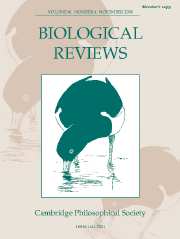Crossref Citations
This article has been cited by the following publications. This list is generated based on data provided by
Crossref.
Röhrich, René C.
Englert, Nadine
Troschke, Katrin
Reichenberg, Armin
Hintz, Martin
Seeber, Frank
Balconi, Emanuela
Aliverti, Alessandro
Zanetti, Giuliana
Köhler, Uwe
Pfeiffer, Matthias
Beck, Ewald
Jomaa, Hassan
and
Wiesner, Jochen
2005.
Reconstitution of an apicoplast‐localised electron transfer pathway involved in the isoprenoid biosynthesis of Plasmodium falciparum.
FEBS Letters,
Vol. 579,
Issue. 28,
p.
6433.
Tonkin, Christopher J.
Struck, Nicole S.
Mullin, Kylie A.
Stimmler, Luciana M.
and
McFadden, Geoffrey I.
2006.
Evidence for Golgi‐independent transport from the early secretory pathway to the plastid in malaria parasites.
Molecular Microbiology,
Vol. 61,
Issue. 3,
p.
614.
Barbrook, Adrian C.
Howe, Christopher J.
and
Purton, Saul
2006.
Why are plastid genomes retained in non-photosynthetic organisms?.
Trends in Plant Science,
Vol. 11,
Issue. 2,
p.
101.
Dahl, Erica L.
Shock, Jennifer L.
Shenai, Bhaskar R.
Gut, Jiri
DeRisi, Joseph L.
and
Rosenthal, Philip J.
2006.
Tetracyclines Specifically Target the Apicoplast of the Malaria Parasite
Plasmodium falciparum
.
Antimicrobial Agents and Chemotherapy,
Vol. 50,
Issue. 9,
p.
3124.
Mullin, Kylie A.
Lim, Liting
Ralph, Stuart A.
Spurck, Timothy P.
Handman, Emanuela
and
McFadden, Geoffrey I.
2006.
Membrane transporters in the relict plastid of malaria parasites.
Proceedings of the National Academy of Sciences,
Vol. 103,
Issue. 25,
p.
9572.
Cai, Xiaomin
Lorraine Fuller, A.
McDougald, Larry R.
Tan, Xiangshi
Cai, Jianping
Wang, Feng
Sacchettini, James C.
and
Zhu, Guan
2007.
Biochemical characterization of enoyl reductase involved in Type II fatty acid synthesis in the intestinal coccidiumEimeria tenella(PhylumApicomplexa).
FEMS Microbiology Letters,
Vol. 272,
Issue. 2,
p.
238.
Dahl, Erica L.
and
Rosenthal, Philip J.
2007.
Multiple Antibiotics Exert Delayed Effects against the
Plasmodium falciparum
Apicoplast
.
Antimicrobial Agents and Chemotherapy,
Vol. 51,
Issue. 10,
p.
3485.
Feagin, J.E.
and
Parsons, M.
2007.
Toxoplasma Gondii.
p.
207.
Sanchez-Puerta, M. Virginia
Lippmeier, J. Casey
Apt, Kirk E.
and
Delwiche, Charles F.
2007.
Plastid Genes in a Non-Photosynthetic Dinoflagellate.
Protist,
Vol. 158,
Issue. 1,
p.
105.
Padmanaban, Govindarajan
Nagaraj, Viswanathan Arun
and
Rangarajan, Pundi N.
2007.
An alternative model for heme biosynthesis in the malarial parasite.
Trends in Biochemical Sciences,
Vol. 32,
Issue. 10,
p.
443.
Seeber, Frank
Limenitakis, Julien
and
Soldati-Favre, Dominique
2008.
Apicomplexan mitochondrial metabolism: a story of gains, losses and retentions.
Trends in Parasitology,
Vol. 24,
Issue. 10,
p.
468.
Dahl, Erica L.
and
Rosenthal, Philip J.
2008.
Apicoplast translation, transcription and genome replication: targets for antimalarial antibiotics.
Trends in Parasitology,
Vol. 24,
Issue. 6,
p.
279.
Nagaraj, Viswanathan Arun
Arumugam, Rajavel
Gopalakrishnan, Bulusu
Jyothsna, Yeleswarapu Sri
Rangarajan, Pundi N.
and
Padmanaban, Govindarajan
2008.
Unique Properties of Plasmodium falciparum Porphobilinogen Deaminase.
Journal of Biological Chemistry,
Vol. 283,
Issue. 1,
p.
437.
Sherman, Irwin W.
2008.
Reflections on a Century of Malaria Biochemistry.
Vol. 67,
Issue. ,
p.
325.
Van Hoewyk, Doug
Pilon, Marinus
and
Pilon-Smits, Elizabeth A.H.
2008.
The functions of NifS-like proteins in plant sulfur and selenium metabolism.
Plant Science,
Vol. 174,
Issue. 2,
p.
117.
Howe, C.J
Barbrook, A.C
Nisbet, R.E.R
Lockhart, P.J
and
Larkum, A.W.D
2008.
The origin of plastids.
Philosophical Transactions of the Royal Society B: Biological Sciences,
Vol. 363,
Issue. 1504,
p.
2675.
Howe, Christopher J.
2008.
Cellular Evolution: What's in a Mitochondrion?.
Current Biology,
Vol. 18,
Issue. 10,
p.
R429.
Vesteg, M.
Vacula, R.
and
Krajčovič, J.
2009.
On the origin of chloroplasts, import mechanisms of chloroplast-targeted proteins, and loss of photosynthetic ability — review.
Folia Microbiologica,
Vol. 54,
Issue. 4,
p.
303.
Nagaraj, Viswanathan Arun
Prasad, Dasari
Rangarajan, Pundi N.
and
Padmanaban, Govindarajan
2009.
Mitochondrial localization of functional ferrochelatase from Plasmodium falciparum.
Molecular and Biochemical Parasitology,
Vol. 168,
Issue. 1,
p.
109.
Alam, Athar
Goyal, Manish
Iqbal, Mohd Shameel
Pal, Chinmay
Dey, Sumanta
Bindu, Samik
Maity, Pallab
and
Bandyopadhyay, Uday
2009.
Novel antimalarial drug targets: hope for new antimalarial drugs.
Expert Review of Clinical Pharmacology,
Vol. 2,
Issue. 5,
p.
469.




